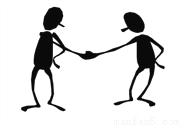题目内容
I saw a man ________ on the ground on my way ________ home.
A. lie;to B. lies;/ C. lying;to D. lying;/
D 【解析】句意:在我回家的路上,我看见一个男人躺在地上。lie躺,现在分词形式是lying。see sb doing sth看见某人正在做某事,故用现在分词lying。on one’s way to+地点,在去某地的路 上,home表示在家,回家,是副词,前面不加介词to,故选D。 阅读快车系列答案
阅读快车系列答案Foods that are well known to you may not be familiar to people from different places around the world. Tourists and travelers often get to try some unfamiliar food. That is part of the fun of traveling. Here are four people’s experiences with foreign food.
David King is a Chinese student in France. “I never had cheese or even milk before I came to France. Cows are seldom seen in my part of China. So there is no milk or milk products. I drank some milk when I first arrived in France. I hated it! I tried cheese, too, but I didn’t like it. I love ice cream, though that’s made from milk.” |
Birgit is from Sweden. She traveled to Australia on vocation. “I was in a restaurant that was special in fish. I heard some other people order flake, so I ordered some, too. It was delicious! Later, I learned that flakes is an Australian name for shark. Now, whenever I see a new food, I try it on purpose. You know why? I remember how much I enjoyed flake.” |
Chandra is a dentist in Texas. She is from India. “ I’m afraid to try new foods because maybe there is beef in them. I’m a Hindu(印度教信徒)and my religion(信仰) stops me from eating meat from the cow. That’s why I can’t eat hamburgers or noodles with meatballs.” |
Nathan is from the United States. He taught for a year in China. “My friend gave me some 100-year-old eggs to eat. I didn’t like their appearance at all. The eggs were green inside, but my friends said the color was normal. Chinese people put something on fresh eggs. Then they put them in the earth for three months. So the eggs weren’t really very old. Even so, I didn’t want to touch them.” |
1.David King is a student in France and he comes from________.
A.China B. Sweden C.India D. America
2..Birgit ordered _____in a restaurant during her vocation in Australia.
A. cheese B. eggs
C. hamburgers D. flake
3.Chandra is afraid to try new foods because_________.
A.she can’t eat food with beef
B. she doesn’t like their appearance
C .she doesn’t like foreign food
D. she doesn’t need any food at all
4.Nathan worked as _______ in China for a year.
A. a worker B. a dentist
C.a teacher D. a student
5.The passage tells us that ___________.
A.David King often drinks milk
B. flake and shark are the same fish
C .a Hindu eats meat from the cow
D. the egg is put in the earth for a hundred years
1.A 2.D 3.A 4.C 5.B 【解析】 试题分析:世界各地不同的人们所知晓的食物不一样,品尝各地不同的食物就成了旅途趣味的一部分。本文叙述了四个不同的人在旅游过程中对于不同食物的不同体验。 1.A 细节理解题。题意:David King是一位在法国的学生,他来自哪儿?A.China中国;B. Sweden瑞典;C .India印度;D. Amer...


